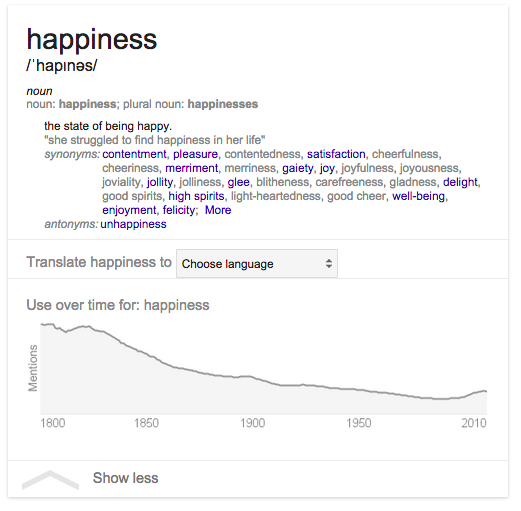And while we offer work life balance tips, we don’t really believe in that because work life fusion is the only feasible option. You don’t stop being one person when you’re at work than you are at home. Plus, positive work life fusion reflects and transmits happiness, which is usually reflected in happiness at work.
But what exactly is happiness? How can it be achieved? Today’s piece looks to explore exactly how to define happiness and what makes people happy.
The Search for Happiness
I started out my search for the ancient secret to happiness just how everybody does: I Googled it. Love it or hate it, to its algorithmic core, Google is perhaps the best insight into how things are, since it reacts to what people really want to know and its suggestions are based on search popularity. International Happiness Indexes and surveys ask people questions, which influences their results, since it is natural to want to be perceived a certain way, which will subconsciously influence results. Since these interviews are often done by talking to someone else, this further influences how they want to be perceived. Google, on the other hand, is often used without moderation and external influence, so people are really searching for what they want to know about.
I’m going to assume that we’ve all Googled before, so you know that when you start to type something into Google or your Chrome Browser, Google goes ahead and tries to guess or suggest what you are searching for. For the purpose of this piece, I used Incognito Search to try not to trigger any ads or influence the results based on my previous searches, to hopefully get valid search suggestions.
So, what are people searching for most?
First, I typed in “define” and suggested searches started popping up:
- #1 Search: “define love”
- #2 Search: “define empathy”
Understanding love and empathy are our greatest searches.
Next, I did “what is”:
- #1 Search: “what is my ip” (which we’ll ignore, but isn’t it always on the bottom of WiFi router?)
- #2 Search: “what is love”

Again, we want to know what love is. (I know you’re humming Foreigner.)
And then, typed in “how to be,” for which you can view the search results below.
How to be happy is still the priority of people and, in their search, wealth and beauty is what could be what they think is the quickest path to that happiness.
(By the way, when I typed in just “How to”, evidently “How to tie a tie” was by far the top result, which means our priorities are indeed a bit skewed, as I can never imagine a neck noose leading to happiness.)
How Can We Define Happiness?

Finally, I typed in “what is happiness”, this time hitting Enter/Return. The official Google definition of Happiness was defined as “the state of being happy” (which, of course, would flunk you in school, where you can’t use a word to define itself.)
How does Google use it in a sentence? “She struggled to find happiness in her life,” as if the perfect way to describe the word was through how it is devoid in our lives, like how black is generally defined by its absence of light.
And then Google really depressed me by showing how the big data of happiness has declined dramatically over the last two centuries. Like a fading heart on Grey’s Anatomy, happiness has almost flatlined, at least in its reference in literature. Although, over the last decade or so, there’s been a slight increase in mentions of happiness (which I assume is due to Britney Spears’ music, as she is obviously the Jane Austin of our time.)
Where does happiness come from?
Next in my search I went looking to the modern-day Socrates. What else but TED talks? And really “happiness” is one of the most—if not the most—popular topics for the most inspiring 18-minute sessions on YouTube. Why?
Well, as Google already proved, there are many people in search of happiness.
Dan Gilbert author of Stumbling on Happiness argues that happiness is the one of the coolest functionalities of our beautiful human brains. Gilbert starts by pointing out that over the last two million years, humans have evolved ostensibly to the top of the food chain because of their ability to think ahead. He says that Ben & Jerry’s didn’t have to test Liver and Onion flavored ice cream, because our ability to imagine that flavor keeps it from even being a viable experiment. Similarly, as one of the lamest animals physically, we continue to survive because we can wage risks and predict and plan for danger before it happens.
Gilbert says it’s in this part of the brain where we have what he calls our “psychological immune system,” which allows us to find happiness even when things don’t go as planned.
We like to believe that external circumstances like wealth or health affects our happiness, but Gilbert has scientifically proven that is not the case, and that, barring a few exceptions, everyone has the same cerebral capacity for happiness.
Quoting Shakespeare: “Tis nothing good or bad, but thinking makes it so.”
So we can basically think ourselves happy.
They even discovered “the fact is that a year after losing the use of their legs and a year after winning the lotto, lottery winners and paraplegics are equally happy with their lives.”
And this isn’t unusual. Gilbert goes on to explain that “A recent study showing how major life traumas affect people suggests that if it happened over three months ago, with only a few exceptions, it has no impact whatsoever on your happiness. Why? Because happiness can be synthesized.”
Gilbert says our psychological immune system is a system of mostly non-conscious cognitive processes that help them change our views of the world so that we can feel better about the worlds in which we find ourselves.
Basically, we can choose to be happy and, even if we try to choose to be unhappy, our brain’s survival instincts is wired to try to make us synthetically happy, aka, we fake it until we make it.
Gilbert defines synthetic happiness as being happy even when things don’t go your way, as natural happiness as being happy when they do. It’s kind of like the grass is always greener in reverse—realizing that what you have is better than you thought before and deciding that other side sucks.
While the synthetic sounds less authentic and desirable than natural happiness, Gilbert says that by deciding things aren’t as bad as they seem, we are creating true happiness that shouldn’t scoffed at.












Replies to This Discussion